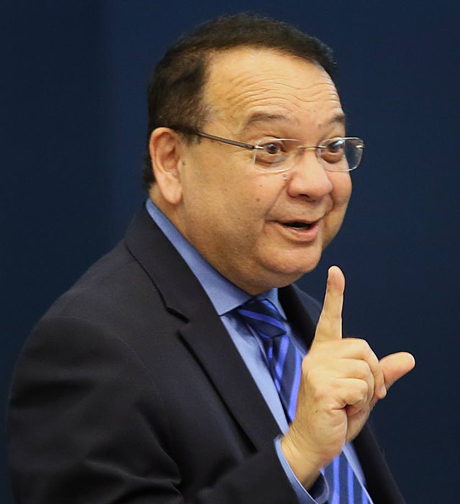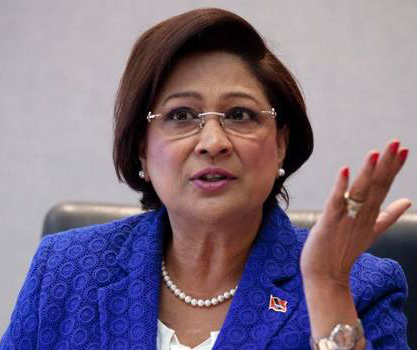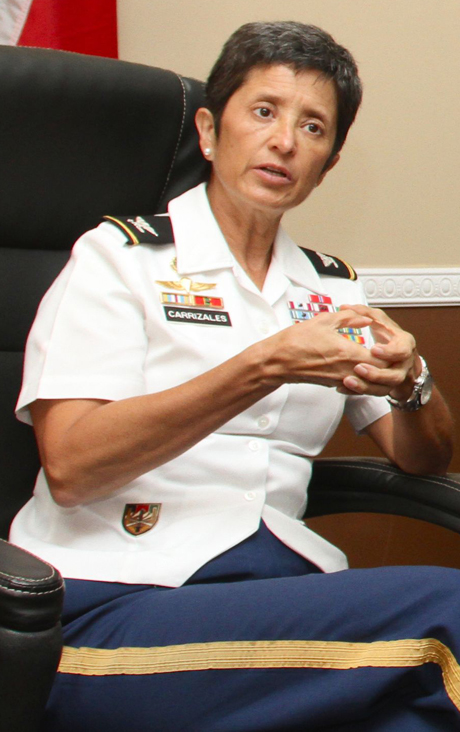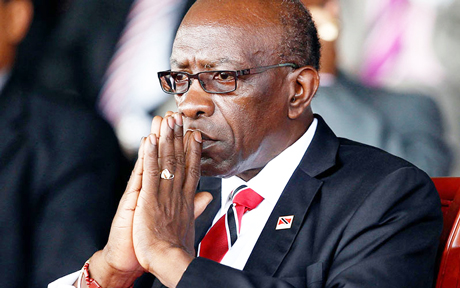Trinidad & Tobago
Petrotrin closure an ‘economic debacle’

Port-of-Spain – Opposition Leader Kamla Persad-Bissessar last week said the ripple effects from Prime Minister Keith Rowley’s “haste to close Petrotrin” has led to the “greatest economic debacle in the history of Trinidad and Tobago”. She also called Rowley to account to citizens on how Petrotrin’s successor companies have fared since the November 30 closure.
“Given that Petrotrin’s operations were a central part of the social and economic fabric of several communities in the southwest peninsula, the shutdown of the company seven months ago has resulted in the devastation of many communities,” she said.
Persad-Bissessar described it as “unacceptable” that Rowley had chosen to report on June 27 to PNM supporters at a public meeting in Point Fortin on such an important national issue.
Said Persad-Bissessar: “We call on Rowley to tell the country when the audited financials of Petrotrin for its 2018 financial year, which ended nine months ago, would be released. Is the government’s reluctance to release these accounts an indication that they have something to hide? There has been speculation that the company actually recorded a profit in 2018.”
She said Rowley should also state the current production at Trinmar, a major part of the Point Fortin community.
“There has been no drilling in Trinmar in over three years. As a result, the production levels of this valuable national asset have plummeted under the watch of Rowley, Stuart Young, and Energy Minister Franklin Khan. This collapse in production in the producing assets of what was Petrotrin (now Heritage Petroleum) is a matter that is glossed over by this PNM government, which is more concerned with Shell,” she said.

Persad-Bissessar said despite Rowley’s recent travels to the Hague, London, and Houston, it seems likely that natural gas production will fall in 2020 compared to 2019, and this comes with significant consequences for Point Fortin’s main employer, Atlantic.
“Regarding the successors to Petrotrin, it is hoped that the Prime Minister will give the country the facts about the performance of these companies. Given the massive loss in oil production, the closure of the refinery, the loss of thousands of jobs, the closure of contractors and the general economic depression in south Trinidad, it is clear that in his haste to close Petrotrin, Rowley has caused the greatest economic debacle in the history of Trinidad and Tobago.”
Meanwhile, Khan hinted last week the Petrotrin refinery will be re-opened under a foreign operator, and predicted many of the retrenched workers would once again work there, but more efficiently.
Khan said the previous Petrotrin was being duped through a scheme by workers to pay costly overtime wages. Such a scheme was among the factors leading to the decision to close the refinery.
He added at the time the government was concerned with the consolidated account of Petrotrin, and it showed a loss of around (TT) $40 billion per annum. Khan also revealed Petrotrin owes the State $3 billion in taxes and royalties.
“The Guaracara refinery and facilities are likely to be leased to an international operator because there is no indigenous capacity to run a refinery of that size and complexity,” Khan said while speaking at a PNM ‘Let’s talk energy’ forum in Point Fortin last week.
He was speaking to the State’s cost to operate the refinery when he revealed the scheme by workers costing around $80,000 in overtime monthly. Said Khan: “The workers had a strategy where their colleagues will call in sick, allowing their friends to work overtime and collect huge salaries.”
He added this scheme was in existence even as Petrotrin had an agreement with the OWTU that contracts that were awarded must be at the union rates. Khan noted the union’s rate for a labourer was $700 a day, yet some workers were earning less than $100 daily. Contractors were demanding money, but it did not go to the workers, he said.
Consequently, the PNM decided to stay in production with new capital investment and new technology, and to get out of the refinery business. The refinery was put on the market up for lease, and at this time the government is evaluating bids. Khan revealed the government will announce the successful bidder in a few months.
“A new operation will be here in Trinidad and Tobago. They will employ a significant part of the very staff that worked at the refinery,” Khan said.
He added former Petrotrin workers who received an attractive severance package when the refinery closed last November will be employed by the new operator. However, the former workers will now become more efficient.
Khan said the new operator will provide a source for crude, and thus the government will not have the financial expenditure of purchasing 100,000 barrels. Additionally, one of the contributing factors is the oilfields were very old, founded by Shell in the 1920s and 1930s.
Said Khan: “We ended up running a refinery doing 150,000 barrels per day with only 40,000 indigenous supply, which means the government had to import 100,000 barrels of crude, and this is what takes the cake. Every barrel refined at Pointe-a-Pierre we were losing US $5 to US $7 per day on the market and that was a hopeless case.”
hospital break-in
“Why would someone want to take God out of their thoughts and steal medicine for the survival of sick people?” wondered acting chief executive officer at the North West Regional Health Terron Gilchrist.
Gilchrist also gave the assurance the pharmacy had not been severely affected in dispersing drugs for in and out-patients, since the missing medications were restocked and operations were again running smoothly.
The break-in took place late last month when suspects entered the building after prying open a padlock on a burglar proof gate at the back of the building. The cupboards in the pharmacy were ransacked and the drugs were stolen.
A staff member said the theft came days after the pharmacy had been restocked.
Gilchrist said plans were underway to upgrade the facility with CCTV surveillance cameras.
NWRHA’s acting manager of corporate communications, Anesa Alleyne confirmed “a host of drugs for the treatment of Non-Communicable Diseases (NCD’s) and infectious diseases were missing.” Additionally, “In addressing the incident, the Authority has reviewed its current security measures at the pharmacy department, and plans are in progress to improve the security infrastructure at the St James Medical Complex.”
She added: “The management of the NWRHA condemns this heinous act against vulnerable patients accessing care at the St James Medical Complex.”
The Authority said it remain committed to providing a safe and secure environment for all employees, patients, and persons visiting the SJMC and all institutions under its purview.

“Prime Minister of little Trinidad and Tobago, he get so big he want to ‘bouff up’ Trump. Well, we’ll find out who is the bigger Trump soon to come,” Persad-Bissessar said at a UNC public meeting.
She noted Rowley’s undiplomatic criticism of the US State Department in its 2019 Trafficking in Persons report, which gave this country an F-grade for its handling of human trafficking.
Rowley criticised the report, saying: “We got an F, they say. Well, if I (were) marking their paper, what would I give them? They have the same problem that we have – thousands of migrants rushing your border, wanting to come into your country because they see a greener grass on your side than on their side.”
Rowley added: “That is the number-one political issue in America! Hundreds of thousands of people, and their own people are telling you that those people, some of them, are treated like dogs and cattle. Children are dying on the border, some of them in cages, hundreds of people in a room that was made for ten. The temperature is 41 degrees, and of course, they have a bigger military. They’ve got a bigger security system. They’ve got an army, a navy, an air force, and they’ve got a bigger treasury than Trinidad and Tobago.”
Persad-Bissessar said the government’s foreign policy and diplomacy have failed, and she described Foreign Affairs Minister Dennis Moses as the man no one understand when he speaks.
Persad-Bissessar also noted it was not the first time Rowley has reprimanded the US, adding that earlier this year he also criticised its Ambassador to Trinidad and Tobago, Joseph Mondello.
In January this year, Mondello described as “deeply concerning” statements coming from the Trinidad and Tobago government recognising the “undemocratic and illegitimate government” of Nicolas Maduro in Venezuela. Rowley took umbrage at Mondello’s statement a few hours later in Parliament.
Persad-Bissessar said back then she warned that the US remains Trinidad and Tobago’s largest trading partner.
Said Persad-Bissessar: “And Madam WPC, Woman Police Constable Camille (Robinson-Regis) in the Parliament, when we were there objecting to the manner in which Rowley was behaving, Camille say, ‘So what? What Trump go do we?’ Well let me tell you what Trump can do you and do Trinidad and Tobago,” said Persad-Bissessar.
She said the CBI programme allows this country preferential privileges with respect to trade with the US.
“That has to come up for renewal in the Congress of the United States of America next year. You want to know what Trump can do you? Trump has the power to determine whether that programme will continue for the benefit of the people of Trinidad and Tobago. That is what Trump can do you,” Persad-Bissessar said.
Police said the 37-year-old Pundit Anil Jaimungal was transferred to another ward at the San Fernando General Hospital, and remains under police and security guard.
Security was increased last week following investigators receiving information about an alleged plot by the assassin to “finish the job”, police told the media following a rigorous search of the hospital compound.
Residents said Jaimungal’s day included counselling visitors seeking religious advice, and performing spiritual-related services. On the day he was shot, Jaimungal was at home speaking with his 58-year-old mother when he received a phone call just before midday. According to police reports, the pundit’s mother said her son was asked for directions to the home by the caller.
A few minutes later, a Nissan B14 arrived at the house, and Jaimungal walked out to meet a man who disembarked from the vehicle. The visitor, who was unknown and dressed in dark-coloured clothing, then shot the pundit. Jaimungal fell to the ground while the assailant stood over him and continued to shoot. He then entered the car and drove away.
Neighbours responded to Jaimungal’s mother’s screams, and contacted South Western Division police. An unconscious Jaimungal was taken to the hospital, following which emergency surgery was performed.

“Within the next year or so, you will eventually have some hardened terrorist fighters return to this country; like it or not,” Colonel Claudia Carrizales said. She was addressing the annual meeting of the local arm of the American Chamber of Commerce on the topic, ‘Economic Stability and Security Threats’.
She said there seems to be some “God-is-a-Trini” wishful thinking that the terrorist fighters will not return, or the US will take care of them.
“Those bad guys who are sitting over there in those detention facilities, the US won’t let them come back. …I am here to tell you that those are your citizens and your responsibility. And as a country you are going to have to deal with it. Are you ready to deal with that kind of threat?” she said.
Carrizales also said the 2018 Carnival threat was “real”. She added it was the training and collaboration between local elite military and police special forces and their American counterparts that prevented the Carnival threat from becoming a reality.
“I will tell you, you passed, because we went from training, advising, and equipping to something happening,” she said. She admitted she was amazed by the conspiracy theories of Trinidadians, and the idea that “they do not blow things up”.
Carrizales said those who participated in the Carnival threat last year were boy scouts compared with the “hardened” terrorist fighters in Middle Eastern detention centres.
“I often tell people that I speak to that the people who attempted to do harm to your country in 2018 during the Carnival threat, you can see them as boy scouts. Yes, they had the radicalisation mentality, and they wanted to do bad things. But when you compare them to what's coming back, those guys are boy scouts,” Carrizales said.
Additionally, “What's been missing in this country, in my opinion – when it comes to terrorism and something not happening here of great impact – has been that charismatic leader. That charismatic, Muslim, hard-core foreign fighter who comes back and can rally the rest of them. Then you have a problem.”
She added: “Then you are going to see the impact that will have on the business community, because businesses are not going to invest in a country that has that type of problem-terrorism.”
However, National Security Minister Stuart Young responded to Carrizales, saying the government has policies in place, and continues to work on counter terrorism.
Also, Carrizales was urged on by Imtiaz Mohammed, public relations officer of the group Concerned Muslims of Trinidad and Tobago, “to be more sensitive and truthful in her assessment of the threat to commit acts of terrorism by Muslims in Trinidad and Tobago”. He added Carrizales was instilling unnecessary fear in the minds of the population.
Said Mohammed: “I wonder if the colonel has been opening her ears and eyes on what is the biggest issue affecting Trinidad and Tobago presently, which we all know is crime. She has contradicted statements made in July 2018 by Saeed Irfan, the director of the Counter Terrorism Unit at the State Department in Washington. He made the call for Trinidad and Tobago government to allow our citizens to return home, and to assist them to reintegrate into society. He didn't see them as hardcore terrorists as the colonel.”

The judgement against Warner was entered by Judge William F. Kuntz. Warner is facing extradition to the US in a separate criminal case, and is a former president of CONCACAF. It is alleged Warner, and fellow former FIFA official Chuck Blazer, made a fortune through embezzlement.
Warner never responded to the CONCACAF lawsuit after he was served in October, 2017. Kuntz granted CONCACAF’s motion for default judgment against Warner, with no opposition, as he was unrepresented in court. The lawsuit was filed in April 2017, and mirrored allegations in the US indictment that resulted in charges against several top football officials.
“There can be no doubt that Warner and Blazer victimised CONCACAF, stealing and defrauding it out of tens of millions of dollars in brazen acts of corruption for their own personal benefit at the expense of the entire CONCACAF region,” the suit said.
The lawsuit also sought (US) $20 million in compensatory damages and unspecified punitive damages. Included is the cost of the Centre of Excellence at Macoya in east Trinidad, which is also the focus of a separate claim in the local courts. Warner has been banned from FIFA for life.
Back in Trinidad and Tobago, CONCACAF filed yet another lawsuit against Warner, in his personal capacity and as a partner in the firm Dr Joao Havelange Centre of Excellence; the centre itself; Renraw Investments Ltd, and CCAN and Company, also in its personal capacity as partners in the centre; Warner's wife Maureen; and accountant Kenny Rampersad and his company.
The Trinidad and Tobago lawsuit is being heard by Justice Ronnie Mohammed, and seeks compensation for the misappropriation of funds with respect to the ownership and use of the Centre of Excellence complex.
Said Le Hunte: “We are in a crisis situation. Therefore, we are calling on everyone to… play their part, even without meters to conserve water, and follow some of the tips that we have been giving out with regard to conservation. The whole message of conservation continues to be important, the whole idea about being your brother's keeper.”
He added: “We have calculated we produce about 240 million gallons of water. If we all target a ten percent reduction via all the little things that we do, that is 24 million gallons of water. Twenty-four million gallons of water more in the system will solve all the problems. Therefore, the cheapest way for the country to get those 24 million gallons of water is by the whole of the population cutting back and conserving. Just ten percent, and we will be in a much better place.”
Le Hunte spoke about introducing a metering system by next year, adding its implementation could cost over (TT) $1 billion.
“How do we encourage the citizens to reduce their consumption patterns, especially in certain areas? That is one of the things that we need to do. It's a very expensive idea of putting down meters… but we have to find a way of putting that down at least on a phased basis in certain areas so that we can try to manage consumption patterns in those areas,” he said.
Le Hunte said the water supply from Caroni is below expected levels and with the harsh dry season, the Navet Dam was now at 37 percent. He said WASA’s institutional specialist, Alan Poon King has indicated the present low levels are the worst he has seen in 30 years.
“We have never been at this low level in the Navet Dam before. We are now taking about ten million gallons of water a day from this dam,” Le Hunte said.
He added as a result of the reduction in production, places as Mayaro and the Siparia Regional Corporation continued to experience water woes. Le Hunte added Mayaro was receiving a “double whammy”, since salt was now leaking into one of its wells, which has to be shut down for a while. Consequently, there has been an increase in water trucking to these Mayaro areas.
